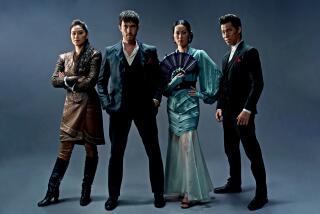‘Emperor’ Takes History to Stunning Heights
- Share via
By 221 BC, after centuries of civil war, seven kingdoms became dominant in China. But the ruler of Qin, Ying Zheng, had been raised to believe he had an ancestral duty to unify all of China, and that was the year of his brutal conquest. He, in fact, succeeded, but what concerns Chen Kaige, in his magnificent and contemplative “The Emperor and the Assassin,” is the enormous cost in terms of human suffering, even for Ying Zheng himself.
Chen’s stunning film has the scope and grandeur of the traditional historical epic, yet the filmmaker plays against the expectations of the genre at every turn. He may show us thousands of troops massing for an assault--but not the assault itself. He repeatedly depicts the aftermath of bloodshed rather than dwelling on the blood being shed. This resolutely non-exploitative approach better allows Ying Zheng’s reign of terror to sink in and to allow its implications to emerge, especially for the monolithic, totalitarian Communist regime that has ruled China for the last half century.
What, in essence, Chen has done is to endow Ying Zheng (Li Xuejian) and the other principals in his fate with Shakespearean dimensions. They are individuals of stature with the capacity for reflection and self-knowledge who may proceed with ruthlessness or naivete--or both--but ultimately come to realize the full motivation and magnitude of their deeds and their awesome consequences. In short, Ying Zheng emerges as a genuinely tragic hero, not just another of history’s many monsters. It may be a cliche to say so, but Chen has given history a human face, just as he did with mid-20th century China, the turbulent background for his masterful “Farewell, My Concubine.”
No court in a Shakespearean tragedy could have more complicated relationships than that of Ying Zheng. The key factor in the ruler’s life is that he was born in exile, in 259 BC, in the kingdom of Zhao, where his father was being held hostage until his death, at which time his son, at age 13, was allowed to ascend the throne of the kingdom of Qin.
Ying Zheng would look upon his childhood as a period of humiliation, although he knew many kindnesses from the Zhao people. His mother (Gu Youngfei) was, in fact, a Zhao princess and, even more significantly, he grew up with a Zhao servant girl who, as Lady Zhao (Gong Li), was to become the great love of his life. And the pivotal figure in his fate. Deceived by Ying Zheng as to his intentions for the Zhao people, Lady Zhao shifts her political and romantic allegiances to Jing Ke (Zhang Fengyi), of the kingdom of Yan, whose fate it is to attempt to assassinate the man who would be the first emperor of China. A subplot finds the Queen Mother, abetted by her lover (Wang Zhiwen), the effete, audacious Marquis Changxin, secretly opposing her son’s rise to power, fearing that her own status would vanish along with her native kingdom. In the midst of all this growing turmoil is Ying Zheng’s wise and humane prime minister, Lu Buwei (played by Chen Kaige himself), the one man with the strength of character to disapprove publicly of his ruler’s rampant imperialist ambitions.
The fates of these individuals and, by extension, China itself, is played out more as a chamber drama than as a war movie, with, Chen, as already stated, suggesting the enormity of the resulting carnage without wallowing in it. Chen places the utmost demands on his actors, with Li showing the hysteria, fear and uncertainty that fueled Ying Zheng’s ferocious campaign. His Ying Zheng is as emotionally extravagant as Gong’s Lady Zhao is self-controlled, strong, outspoken but giving way to emotional display only under the most extreme prevarication. Zhang’s assassin is a man who craves to live in peace and simplicity, a man who would like to put all killing behind him, but philosophically, if ruefully, accepts the inevitability of his destiny. Chen’s three stars, all of them previous collaborators with the director, rise to the towering occasion, as do the supporting players.
“The Emperor and the Assassin” is a stirring, thought-provoking feat of filmmaking, accomplished in every facet. Throughout the film, Chen sustains a disturbing undertow, suggesting that the ultimate unification of nations is inevitable and, given human nature, inevitably tragic as well. In suggesting what we might be, Chen Kaige never loses sight of what we are.
* MPAA rating: R, for violence. Times guidelines: Although the film emphasizes the consequences of violence rather than its actual depiction, it is too intense for children, especially one sequence devoted to the wholesale elimination of all youngsters.
‘The Emperor and the Assassin’
Gong Li: Lady Zhao
Zhang Fengyi: Jing Ke
Li Xuejian: Ying Zheng, King of Qin
A Sony Pictures Classics release. Director Chen Kaige. Producers Han Sanping, Shirley Kao, Satoru Iseki. Executive producers Chen Kaige, Tsuguhiko Kadokawa, Hiromitsu Furukawa. Screenplay Wang Peigong, Chen Kaige. Cinematographer Zhao Fei. Editor Zhao Xinxia. Music Zhao Ziping. Costumes Mo Xiaomin. Production designer Tu Juhua. In Mandarin, with English subtitles. Running time: 2 hours, 41 minutes.
At selected theaters.
More to Read
Only good movies
Get the Indie Focus newsletter, Mark Olsen's weekly guide to the world of cinema.
You may occasionally receive promotional content from the Los Angeles Times.










